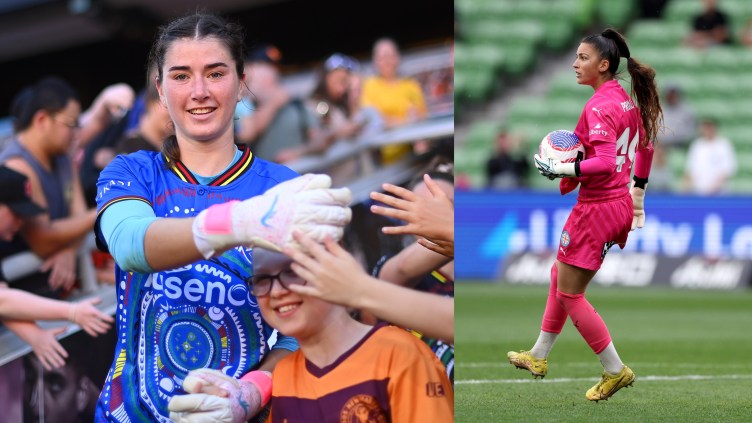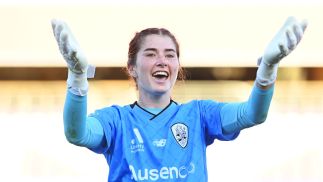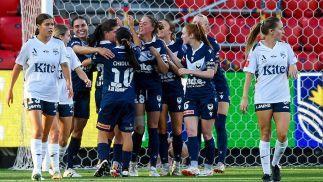The Young Matildas, Australia’s Under-20 team for players born in 2004 or later, will play in the semi-finals of the AFC Under-20 Women’s Asian Cup on Wednesday night.
After the Young Matildas’ opening match in ankle-deep snow gained attention nationwide for the rare spectacle, the team would go on to win a perfect three games from three and concede only a single goal.
Unlike previous tournaments, the pressure of FIFA Women’s U20 World Cup qualification has already been relieved. Where in the past the AFC would have just three World Cup spots on offer – making the third-place play-off as important as the final – four spots and getting out of the group stages was enough for a ticket to the major event to be staged in Colombia in August.
QUALIFIED: World Cup-bound Young Matildas tick off one goal but ‘job isn’t done’ at Asian Cup
But before attention can turn to the World Cup, the chance to make some history starts with Australia’s semi-final against Japan.
The Young Matildas having fallen at the semi-final stage of this tournament in 2006, 2017 and 2019. Beat Japan, who have won the last three editions of the U20 Asian Cup, and the team would be in rare territory for an Australian youth side. Only the 2010 Young Socceroos (at the time Under-19s) have ever made it to an age-group final in an AFC tournament.
With a team raised in the Liberty A-League, 22 of the 23 members of the squad are current players in the competition, here is what you need to know ahead of Wednesday night’s big game.
The coach
Leah Blayney won 16 caps for Australia between 2003 and 2009 and the 37-year-old played in the old W-League for Sydney FC and Canberra United.
Blayney took the Young Matildas to the 2019 edition of the Asian Cup, but a team headlined by current-day Matildas stars Mary Fowler and Kyra Cooney-Cross ultimately finished fourth and missed out on U20 World Cup qualification.
A reprieve would come post-covid however, as North Korea withdrew from the 2022 U20 World Cup, leaving Blayney to become the first woman to coach an Australian team at a FIFA tournament.
Seven players that went to the 2022 U20 World Cup in Costa Rica were young enough to remain in the Young Matildas set-up, with form and fitness seeing all seven retained for the current Under-20 Asian Cup.
Blayney also oversees the Future Matildas Program which provides elite level training to identified players, and is also well known to Liberty A-League audiences as regular expert commentator on matches.
The Matilda – Jessika Nash
Australia’s record identifying senior Matildas through their youth national teams has been consistently strong in the last decade, with seven of the 2019 U20 Asian Cup team going on to win a senior cap, 11 from the 2017 squad and 10 from the class of 2015.
The tally for this year’s tournament is already one, with Young Matildas captain Jessika Nash selected for her solitary senior Matildas appearance in November 2021 when she was just 17.
Nash suffered a short-term knee injury in January while playing for Melbourne Victory but has not missed a beat at the U20 Asian Cup, scoring against Chinese Taipei after a successful venture forward from right back.
The defence
Australia’s defence has been the least rotated of its positions at the tournament to date, with Melbourne City’s Naomi Chinnama and Western Sydney Wanderers’ Alexia Apostolakis the preferred duo at centre-back. Canberra United’s Sasha Grove has been an energetic presence getting forward from left back, while club teammate Chloe Lincoln has played all three matches in goal.
Other players subbed on to play in the backline through the group stage include Melbourne City’s Tijan McKenna who played at right-back, Wanderers’ Gemma Ferris in the centre and Canberra’s Tegan Bertolissio on the left. But expect the Grove-Chinnama-Apostolakis-Nash back four to start against Japan.
The midfield mix
Blayney has rotated Australia’s midfield extensively through the group stage with short breaks between each of the games. Sydney FC trio Zara Kruger, Maddie Caspers and Indiana Dos Santos were partnered for game one against Korea Republic, with fellow Sky Blue Shay Hollman coming in for group games two and three. Melbourne Victory’s Alana Murphy started against Uzbekistan, while Melbourne City’s Daniela Galic moved into midfield after a different front three was tried against Chinese Taipei.
The midfield composition against Japan is hard to anticipate, with the three-time defending champions coming off a bruising 1-0 loss to North Korea in their final group game. It may bode well for the combative Hollman to retain her starting place, however Caspers did not play in Australia’s final group game in a potential nod to being rested up and Kruger was subbed out after 65 minutes.
LIBERTY A-LEAGUE R19 TALKING POINTS: Template clubs can follow to cash in on ‘really tough’ mid-season exits
Indiana Dos Santos was able to defy the snow and show her creativity in the tournament opener, before an ankle knock forced her substitution out. But any concerns were allayed by 16 minutes off the bench for the 16-year-old against Chinese Taipei.
Kruger and Murphy have been the preferred set piece takers when on the pitch, while Perth Glory’s Georgia Cassidy has been twice used as a second-half substitute in group stage.
The attacking options
Central Coast Mariners speedster Peta Trimis is Australia’s only multiple goal scorer in the tournament to date, having found the back of the net against Korea Republic and Uzbekistan. Trimis’ instincts for goal and composed finishing has served her well, with similar looking strikes to her three goals netted for the Mariners in her debut Liberty A-League season.
Newcastle pair Lara Gooch and Claudia Cicco showed their ability to stretch defences in the group stage, with the pace of both a big factor in Australia overturning their 1-0 deficit to defeat Korea Republic.
Cicco, more regularly seen at right back in the Liberty A-League, has played on the right wing, while Gooch’s dribbling through the middle was on show in group game two against Uzbekistan.
Rising star Galic – who linked up with the Young Matildas after spending time in senior Matildas camp – has one goal and is a versatile option in both midfield and across the attacking three.
The wildcard is English-born, Australian-raised Milly Boughton. The former Football NSW Institute junior is currently on the books of third-tier English club Ipswich town, on loan from WSL outfit Tottenham. Boughton is a point of difference to Australia’s straight-line speed with her bustling and physical style of protecting the ball.
Jynaya Dos Santos, older sister of Indiana, has one headed goal for Sydney FC in the Liberty A-League this season, and in a squad not particularly tall is another attacking option.
Looking ahead
The winner of Korea Republic-DPR Korea will be waiting for the winner of Australia-Japan in the final, while there will still be a third-place play-off for the defeated teams.
Qualifying for the FIFA U20 Women’s World Cup in August and September has dangled a significant carrot in front of age-eligible players to finish the Liberty A-League season in good form.
If not for injury, Adelaide United’s Emilia Murray would have played at the Asian Cup given she captained the Young Matildas as recently as November 2022. Melbourne Victory’s Ella O’Grady also fell victim to injury, having scored against China for the Young Matildas in two away friendly matches played in December.
Perth Glory’s Grace Johnston fell victim to a syndesmosis injury to end what had been a promising first season in the Liberty A-League, while an injury that ruled out Wanderers’ Amy Chessari from Round 5-13 curtailed her game time and candidacy for selection.
Other Liberty A-Leauge players to feature in qualifying included Victory’s Ava Briedis, Sydney’s Sienna Saveksa and Central Coast’s Maya Lobo, while players selected for the December friendlies but not the U20 Asian Cup were Newcastle’s Zoe Karipidis and Milan Hammond and Western United’s Avaani Prakash.
It sets up a finish to the Liberty A-League season where there will be no such thing as a dead rubber for players hoping to make their case for an U20 World Cup selection.
Featured image: Football Australia





